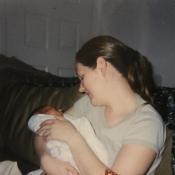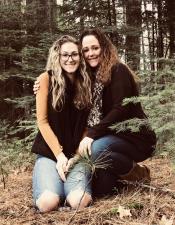Stacey Finkle
Stacey Finkle: Little Baby, Big Fears
“It took us about eight months to finally conceive. When we were trying to conceive, I felt like a failure because I wasn’t getting pregnant, and I thought something was wrong with me. My sisters were all getting pregnant, they were all having babies and I wasn’t. Everything was fine up until I was about 6 months pregnant. I developed toxemia (elevated blood pressure and the presence of excess protein in the urine), which meant that I had to go to the hospital every time I had a doctor visit. I was already a worrywart as it was, and that didn’t help. It was the scariest experience and my husband was working, so he couldn’t go with me. They would attach me to monitors and it really stressed me out. That’s where my anxiety really started.
At 8 months, I was meeting with my OB every week because I was so high risk. One day, I had my visit, and they sent me up to the hospital, like always, but my doctor didn’t tell me that she decided it was time for me to deliver. She broke my water, and Alexis was with us within seven hours.

She was five pounds, one ounce--that’s very little. She was healthy, but I wasn’t. I was scared. Plus, my family lived here in Redding, and we were living in Sacramento at the time. I was far away from people who could help me and teach me to be a mother.
We were able to take her home and she barely fit in the car seat and I remember looking at the nurse like, ‘You’re going to let us leave the hospital? You’re going to let me take her home?’ We had to prop her up in the car seat with nursing blankets. I shut down when we got home. I called the doctor all the time because I didn’t think I was doing anything right. I looked at my daughter and I felt love, I felt like she was a part of me, so I never experienced what some women do. I bonded with her, but I was so scared all the time that something was going to happen to her. I couldn’t sleep because I was afraid she’d stop breathing, so I’d sleep with my hand on her and then I’d fall asleep for a few minutes before jolting awake. It was a very trying time. The worry never left. Ever. She’s 18 and I still worry. Despite my fear, she thrived.”

Medicine for the Body
“While I was pregnant, I didn’t really talk about my fears with my husband. He could tell I was withdrawn, but we didn’t talk about it. I didn’t know what was happening. My health providers talked about it like it wasn’t a big deal. They didn’t make it seem like I should worry about it. Because I didn’t know any better, I just internalized it all. Her dad and I divorced because I was so sad. We ended up staying together for about a year and a half after she was born and then we went our separate ways. Alexis and I moved back to Redding, and her father and I shared custody.
It was her pediatrician that said, ‘I think you’re battling with something, you should have been past this already.’ When I went to my doctor, they immediately pushed medication on me. They suggested that I see a counselor or a therapist, but all they could do was to give me medication. Taking medicine for my anxiety was very frowned upon by my daughter’s father. He was very upset that I needed something to help me get out of what was happening. None of my sisters dealt with depression at all, so it was like, ‘Stacey’s just anxious. She’s just going through her thing. This is normal.’ But it wasn’t. I knew it wasn’t. I knew there was something else, so I started medication. That was a tough decision since no one thought I should. It brought me up a little bit, but it didn’t do much."

Medicine for the Soul
“I wish that the stigma wasn’t there. I was so ashamed of how I felt. I didn’t want to share it with my family. I didn’t want them to frown upon me and say well … ‘just snap out of it. Knock it off.’ It’s so easy for people to say that when they don’t know. They don’t feel what we feel. They don’t have a clue. Even now, I battle with depression from time to time, but I’m surrounding myself with people that know that about me and know that I need some time and I will be okay.
I’d love to be able to help even one woman realize that they’re not alone. There are women out there to talk to, there are support groups out there. What you’re feeling is important, it is normal. You never know how strong you are until you have to be.
Being a parent is a blessing, but we don’t want other people to judge us for the things that can naturally accompany the pregnancy experience. People don’t want to talk about depression. They don’t want to talk about feeling sad. We don’t talk about it because we’re afraid of being judged. We’re always comparing ourselves to others, especially with social media nowadays. We’re all so different, but we want to be the best parent ever.”
Some call it the baby blues and some call it postpartum depression, but there are a range of perinatal mood and anxiety disorders that can affect mothers. Click below for stories told by six Shasta County moms. Their honest stories don't sugarcoat motherhood. Instead, they share their hardships -- during and after pregnancy -- and how they found support and joy in motherhood.
